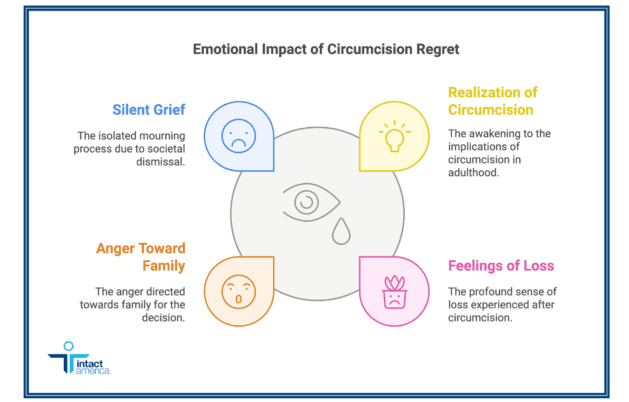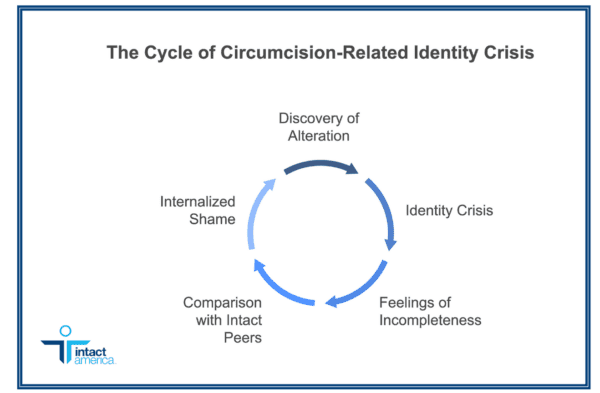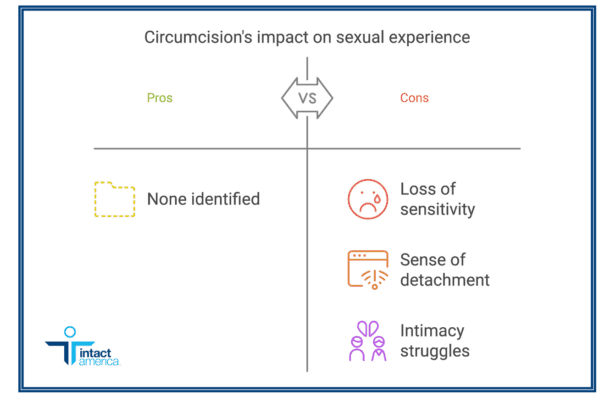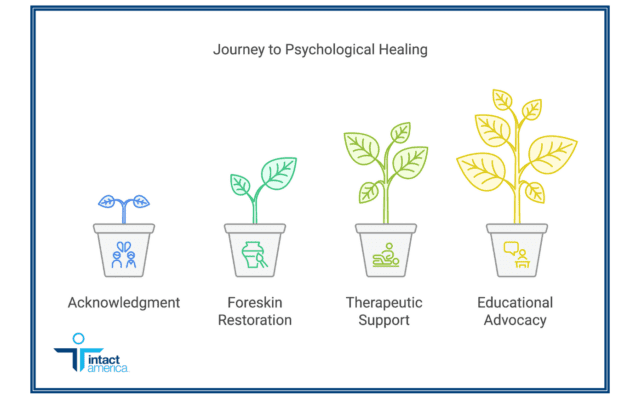
Circumcision is a permanent alteration with emotional echoes that can surface years, even decades, later.
While society tends to downplay the psychological ramifications, men who come to understand the full implications of what was taken from them often find themselves grappling with complex emotions that don’t simply fade with time.
The Reality of Circumcision Regret

For many men, the realization of what circumcision entails doesn’t hit until adulthood—often when they stumble upon information about the foreskin’s functions or hear testimonials from intact men describing sensations they’ll never experience. This awakening can spark profound feelings of loss, anger, and betrayal.
a. “Why didn’t anyone protect me?”
Men who learn about circumcision’s impact later in life frequently express outrage that such a significant decision was made without their consent. There’s a sense of being violated, not by strangers, but by the very people who were supposed to protect them.
b. A Silent Grief
Unlike other forms of bodily trauma, circumcision regret often exists in isolation. Men are left to mourn a loss that society dismisses as trivial. This lack of acknowledgment compounds the pain, leaving many to suffer quietly.
c. Anger Toward Family
When men confront their parents about the decision, they’re often met with defensiveness or dismissive remarks like, “We thought it was the best thing at the time.” While well-intentioned, these responses rarely provide closure and can strain family bonds.
Erosion of Identity and Body Image

Circumcision is marketed as a routine procedure, yet for many men, discovering the truth about what was removed sparks a crisis of identity. The realization that part of their sexual anatomy is missing can lead to lasting body image issues.
a. Feeling “Incomplete”
Some circumcised men report feeling as though they were deprived of something integral to their manhood. The awareness that their body was permanently altered without consent fosters a sense of incompleteness—like they were born whole but made “less than” by cultural norms.
b. Comparisons to Intact Peers
In locker rooms, online forums, or intimate relationships, the inevitable comparison between circumcised and intact men can deepen insecurities. Circumcised men often feel cheated by a decision they had no part in, and the differences become a reminder of what was lost.
c. Internalized Shame
Society normalizes circumcision to the point where questioning it can feel taboo. This cultural reinforcement discourages men from speaking out, leaving them with unresolved feelings of shame about their altered anatomy.
A Silent Saboteur: The Sexual Fallout

Circumcision’s impact isn’t limited to appearance—it fundamentally alters sexual experience. Men who grow up circumcised may not realize what they’re missing until they hear firsthand accounts from intact men or experience diminished sensation over time.
a. Loss of Sensitivity
One of the most documented consequences of circumcision is a reduction in sexual sensitivity. As the glans becomes desensitized due to constant friction and keratinization, men may notice a gradual dulling of sensations during intimacy.
b. “Something Feels Missing”
This is a phrase echoed by many circumcised men who describe a sense of detachment during sexual activity. Even if they can’t pinpoint the exact difference, there’s an awareness that the experience isn’t as rich or pleasurable as it could have been.
c. Intimacy Struggles
For some men, the sexual complications resulting from circumcision lead to performance anxiety, frustration, and even relationship difficulties. They may avoid discussing the issue out of embarrassment, contributing to a cycle of unaddressed dissatisfaction.
The Long Shadow of Uninformed Decisions
The emotional toll of circumcision often extends into relationships, where partners are left to navigate the fallout alongside the men affected. While circumcision is framed as a decision made “for the child,” the repercussions rarely stay confined to the individual.
a. Partners Share the Burden
Women and partners of circumcised men frequently express frustration with the lack of sensitivity and lubrication during intercourse. This often results in discomfort for both parties, yet few correlate the issue with circumcision, leaving it untreated.
b. Mental Hurdles in Parenthood
Men who regret their circumcision often face difficult emotional terrain when becoming fathers. The decision of whether to circumcise their sons triggers a deeply personal and sometimes agonizing dilemma. The desire to break the cycle often clashes with pressure from family or cultural norms.
Healing the Psychological Wounds: Moving Toward Restoration

Acknowledging the emotional consequences of circumcision is the first step toward healing. Pathways to reclamation and self-acceptance are essential for men who feel robbed of their bodily autonomy.
a. Foreskin Restoration
While nothing can fully reverse circumcision, foreskin restoration techniques (stretching the remaining skin to replicate some functions of the foreskin) have provided psychological relief for thousands of men. This process helps restore lost sensitivity and gives men a sense of agency over their bodies.
b. Therapeutic Support
Mental health professionals specializing in bodily trauma or circumcision regret offer valuable spaces for men to process their emotions. Connecting with support groups or online communities can also provide comfort through shared experiences.
c. Educational Advocacy
Men who’ve experienced circumcision regret often channel their frustration into activism, raising awareness about the procedure’s risks and advocating for informed consent. This process of advocacy transforms pain into purpose.
Rewriting the Narrative: Ending the Cycle for Future Generations
By acknowledging the emotional weight circumcision carries, society can foster a new era of bodily autonomy—one where unnecessary surgical interventions on infants become relics of the past.
a. Informed Parenting
Parents deserve access to unbiased information that highlights the foreskin’s functions and the potential consequences of circumcision. By shifting the conversation from tradition to autonomy, future generations can grow up empowered to make decisions about their own bodies.
b. Challenging Cultural Norms
As more voices speak out against circumcision, the stigma surrounding intact anatomy begins to fade. Through education and open dialogue, circumcision can be reframed not as a “normal” procedure but as a choice best left to the individual.
Circumcision is more than skin deep. Its emotional and psychological impact reverberates across lifetimes, reshaping identities and influencing relationships. By addressing these hidden wounds, we can advocate for a future where every individual’s bodily integrity is respected from the start.
Join us in the fight for bodily autonomy—because every boy deserves the right to his own body.






No Comments